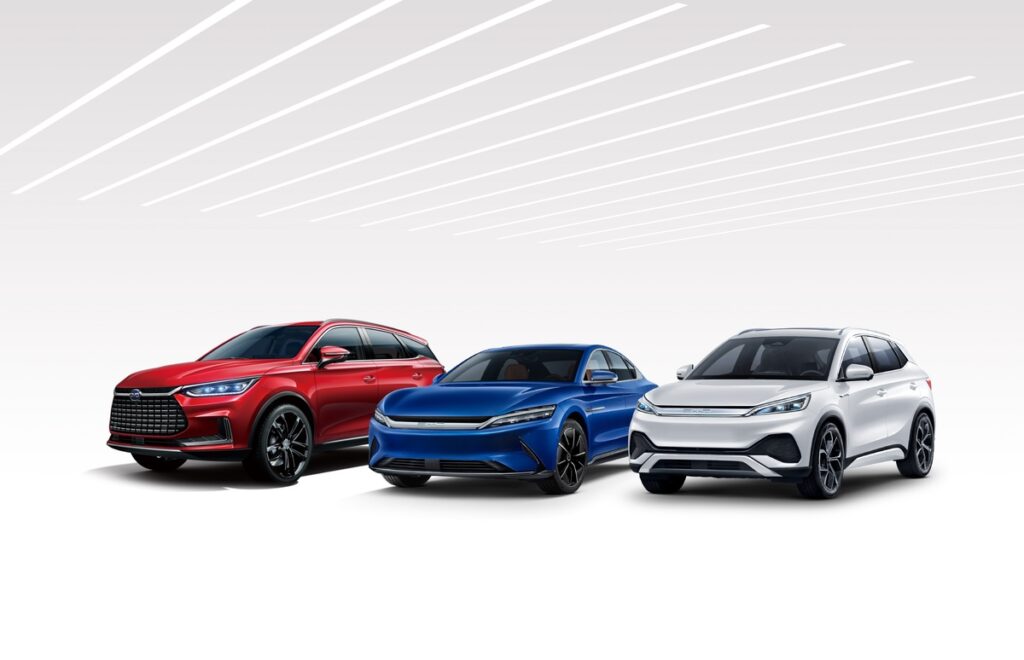Chinese car manufacturers are making their presence known in Europe, taking on their Western counterparts, writes Autovista24 journalist Rebeka Shaid.
Europe’s automotive industry is dominated by local players, with Volkswagen (VW) Group taking the top spot as the region’s largest carmaker. But that is not stopping new players from China entering the crowded European market, especially as electrification is in full swing. Competitive product portfolios, customer-centric sales models, and a will to succeed define the new players.
China and Europe are the two largest electric-vehicle (EV) markets in the world. While European carmakers have long exported cars to the Asian country, where they operate numerous production sites and joint ventures with local companies, now, the tide has turned.
Consulting firm Inovev noted that around 75,000 new cars from Chinese manufacturers were registered in Europe in the first half of 2022 and it is expecting 150,000 units for the rest of the year.
Electromobility is opening a window of opportunity for these Asian manufacturers, which are trying hard to build recognisable and reputable brands in the region. Nio, XPeng, BYD, Great Wall Motors (GWM), Hongqi, and BAIC are just a handful of carmakers working to take on established leaders across the continent.
Chinese carmakers are following clear ambitions: to increase their international competitive edge after years of mainly supplying cars to developing economies. Although many consumers in Europe are still unfamiliar with ‘made in China’ cars, that is starting to change.
‘To date, more than 10 Chinese car manufacturers have launched, or are about to launch, EVs in Europe. Two of them have achieved some initial success: Polestar and MG have made themselves among the top 20 best-selling EVs in Europe,’ Jan Yang, senior managing director at global consulting firm Simon-Kucher, told Autovista24. MG is owned by SAIC Motors and Polestar by Geely, both Chinese businesses.
‘In contrast, other Chinese automakers have barely made a mark in Europe. But this may change soon, as Nio and Co are making inroads into major European markets like Germany after testing the waters in Norway,’ Yang added.
Electromobility offers
Also hoping to gain a foothold in Europe is GWM. The Chinese company runs the premium SUV brand Wey and produces all-electric vehicles under the Ora brand name. Last month, the carmaker signed a partnership with Europe’s largest dealer group, Emil Frey, as it prepares to launch in Germany during the last quarter of the year.
As Europe’s biggest automotive industry, Germany is a strategic market for Chinese car brands, not least because the country is among the most EV-friendly territories in Europe. Data from the German Federal Office for Motor Traffic (KBA) shows that in the first seven months of 2022, around 7,000 news cars from Chinese manufacturers were registered.
Germany’s Association of International Motor Vehicle Manufacturers (VDIK) has seen membership increase as more Asian brands enter. ‘There have already been individual attempts by new manufacturers from Asia to enter the European market. But what we are experiencing now has other dimensions. These are very serious efforts to gain a foothold here,’ the VDIK told Autovista24.
The newcomers from Asia are eager to present high-tech quality cars to European customers, who are already spoilt for choice. GWM plans to roll out an all-electric model, known as the Funky Cat, which has been described as a competitor to Volkswagen’s ID.3. It will also launch a plug-in hybrid (PHEV), the Coffee 01, in the coming weeks.

Eye-catching names aside, the company said that the two models would set the course for their highly publicised market entry. The cooperation with Emil Frey is significant and a milestone for GWM although the details of the partnership are still under wraps.
‘We are currently working hard to set up structures and implement plans. We would like to inform our potential partners at dealer level first before we communicate further publicly,’ the Emil Frey Group told Autovista24.
The EV market in Europe is ready for disruption and Chinese brands are not only aiming to match their European counterparts, but also harbour ambitions to challenge them on range and price.
GWM’s battery-electric vehicle (BEV) is expected to have a range of up to 400km, with list prices likely to start from €30,000. Its PHEV model, Wey’s flagship car, will reportedly have a range of 150km, costing around €50,000. Both models achieved five-star Euro NCAP ratings this month, showing the company is up to the task. With Euro NCAP testing more Chinese cars than it has ever done this year, it said ‘Great Wall really sets the standard for others to follow.’
Tech, connectivity, and innovation
While safety and pricing strategy play a key role for Chinese brands entering Europe, innovation and technology is also opening doors for them. Asian carmakers are eager to offer the latest tech and connectivity services, increasingly finding ways to set themselves apart from their Western competitors.
‘While European OEMs may view electrification merely as a transformation of powertrain, Chinese EV upstarts have adopted a different product approach. The Chinese EVs are typically equipped with state-of-the-art technologies, more appealing to the younger generation,’ said Yang.
‘The Chinese take smartification to the next level in that the product is made extendable – consumers would be able to upgrade software as well as some of the hardware so that they do not only own the car but also grow with it. This kind of customer engagement was unseen in Europe,’ he added.
Luxury marque Hongqi, part of China’s FAW Group, is showing off vehicles that can park and charge autonomously, without the need for charging plugs – while here in Europe carmakers like Volvo are still trialling EV wireless charging systems. Earlier this year, Hongqi delivered the first batch of its E-HS9, an all-electric smart SUV, to customers in Norway. More recently, it struck a deal with a Dutch automotive retailer to distribute its vehicles in the country.
Meanwhile, Nio is on an expansion course in Europe, with one of their key services including battery swapping – another way to stand out from the crowd. This allows customers to lease the battery – the most expensive part of an EV – instead of buying it, which then knocks thousands of euros off the initial list price. At dedicated swapping stations, Nio drivers can change their depleted batteries for fully-charged ones, all in under five minutes, and the company is now planning to produce swap stations in Hungary.

Nio’s peers in Europe include startups such as XPeng and Aiways, the latter of which wants to offer ‘exciting’ and affordable cars. Aiways’ first model, an all-electric SUV – the U5 – made it onto the final list for the 2022 Car of the Year in Europe. Costing just under €40,000, the U5 comes with a 400km range and can charge from 30% to 80% in around 27 minutes. The manufacturer plans to roll out one new model each year, saying its vehicles are ‘reasonably priced.’
‘Traditional car manufacturers still have an advantage in absolute sales figures, but with increasing awareness, new models that are both price-competitive and attractive in terms of design, we are reckoning on good chances on the European market. We are in 15 European countries and already have products driving on the roads,’ Aiways told Autovista24.
Then there is Geely-owned Lynk & Co, which is eager to challenge automotive conventions with its subscription-based business model. Described as ‘Netflix for cars’, the company runs so-called ‘clubs’ across Europe. Its membership-based approach allows users to access a car on a month-to-month basis. Its PHEV is known as the 01 and in Germany alone, 2,000 Lynk & Co cars were newly registered in the first seven months of the year.
‘Our main difference is our business offer where our members can get a good car that they can keep forever or leave whenever,’ Lynk & Co told Autovista24. ‘Subscribe month-to-month for €550 or borrow a Lynk & Co 01 with insurance, maintenance, and more included. Or go all-in and buy your 01. Whatever works best for the member. Our Lynk & Co 01 offers up to 70km full-electric range so that our members can commute on electricity but go and explore with the combined powertrain.’
Dethroning Tesla?

Chinese EV brands are increasingly grabbing headlines, with news outlets recently claiming that automotive giant BYD sold more electric cars than Tesla during the first half of the year. While BYD recorded around 640,000 EV sales from January to June – compared to Tesla’s 564,000 – this figure crucially included PHEVs.
Nonetheless, BYD’s figures are impressive as it sold nearly 330,000 BEVs during that time, up 240% from a year ago. It has become one of the largest EV makers in the world and is planning market expansion in Europe this autumn after launching in its pilot-market, Norway, about a year ago.
Like other Chinese brands, it is promising quick deliveries – a key selling point – and is initially targeting the Benelux and Nordic countries. The company has secured partnerships with select dealerships and is planning to introduce three BEV models in the region, including a ‘European-styled’ C-segment SUV.
BYD appears eager to emphasise this point, no doubt to appeal to European customers. The manufacturer works with more than 200 designers from countries such as Italy, Spain, Switzerland, and Germany.
Modern smart cars made in China that look and match, if not surpass, what European drivers are used to – especially when it comes to the latest technology – are shaking up the market. Legacy automotive brands in Europe will be watching closely in the months and years to come.
This content is brought to you by Autovista24.


 Close
Close